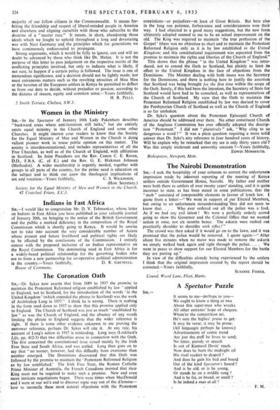The Coronation Oath
Sue,—Dr. Sykes now asserts that from 1689 to 1937 the promise to maintain the Protestant Reformed religion established by law " applied to England, not to Scotland, for the introduction of the words in the United Kingdom' (which extended the phrase to Scotland) was the work of Archbishop Lang in 1937." 1 think he is wrong. There is nothing in the form used down to 1937 to show that this promise applied only to England. The Church of Scotland was just as much "established by law" as was the Church of England, and the absence of any words limiting the phrase to England suggests that the wider reference is right. If there is some other evidence unknown to me proving the narrower reference, perhaps Dr. Sykes will cite it. At any rate, his account of Lang's action in 1937 is misleading. Lang says (Lockhart's Life, pp. 412-3) that two difficulties arose in connection with the Oath. The first concerned the constitutional issue raised mainly by ,the Irish Free State and South Africa, and was settled. Lang then goes on to say that " no sooner, however, had this difficulty been overcome than another emerged. The Dominions discovered that this Oath was followed by the promise to maintain the Protestant Reformed Religion as by law established.' The Irish Free State, the Roman Catholic Prime Minister of Australia, the French Canadians insisted that their King must not be required to make such a promise. New and even more intricate negotiations began. There were times when MacDonald and. I were at our wit's end to discover softie way out of the dilemma—. how to reconcile' these most natural objections with the Protestant convictions—or prejudices—at least of Great Britain. But here also in the long run patience, forbearance and considerateness won their way. I had objected to a good many suggestions, but the new form ultimately adopted seemed to me to be an actual improvement on the old.- The King was required to maintain the true profession of the Gospel' (there was no objection to that) and to maintain the Protestant Reformed Religion only as it is by law established in the United Kingdom; and this constitutional requirement was separated from the promise to maintain the rights and liberties of the Church of England."
This shows that the phrase " in the United Kingdom " was intro- duced, not to extend the _Oath to Scotland, but plainly to limit its effect to the United Kingdom in the face of objections from the Dominions. The Minister dealing with both issues was the Secretary for the Dominions, and there is nothing here to justify the assertion that Scotland was being brought for, the first time within the scope of the Oath. Surely, if this had been the intention, the Secretary of State for Scotland would have had to be consulted, as well as representatives of the Church of Scotland. My view that the Oath to maintain the Protestant Reformed Religion established by law was devised to cover the Presbyterian Church of Scotland as well as the Church of England is so far unshaken.
Dr. Syke's question about the Protestant Episcopal Church of America should be addressed over there. No other constituent Church of the Anglican Communion has ever officially adopted the descrip- tion "Protestant" 1 did not "plaintively". ask, "Why cling to so dangerous a word ? " It was a plain question requiring a more solid answer than Dr. Syke's, airy reference to four hundred years of history. Will he explain why he remarked that my see is only thirty years old ? Was this simply irrelevant and unworthy sarcasm ?—Yours faithfully, EDWIN MONMOUTH. Bishopstow, Newport, Mon.


































 Previous page
Previous page